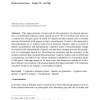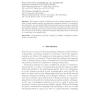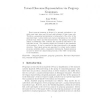JOLLI
2007
13 years 4 months ago
2007
This paper investigates whether the model of local rhetorical coherence suggested in Knott et al. (2001) can boost the performance of the Centering-based metrics of entity coheren...
JOLLI
2007
13 years 4 months ago
2007
Abstract This paper presents a framework for the generation of coherent elementary conversational sequences at the speech act level. We will embrace the notion of a cooperative dia...
JOLLI
2007
13 years 4 months ago
2007
A fundamental part of the process of referring to an entity is to categorise it (for instance, as the woman). Where multiple categorisations exist, this implicitly involves the ado...
JOLLI
2007
13 years 4 months ago
2007
JOLLI
2007
13 years 4 months ago
2007
JOLLI
2007
13 years 4 months ago
2007
This paper presents an approach to artificial intelligence planning based on linear temporal logic (LTL). A simple and easy-to-use planning language is described, PDDL-K (Planning...
JOLLI
2007
13 years 4 months ago
2007
This paper reports on an approach to model generalized implicatures using nonmonotonic logics. The approach, called compositional, is based on the idea of compositional semantics, ...
JOLLI
2007
13 years 4 months ago
2007
JOLLI
2007
13 years 4 months ago
2007
Every pregroup grammar is shown to be strongly equivalent to one which uses basic types and left and right adjoints of basic types only. Therefore a semantical interpretation is i...



